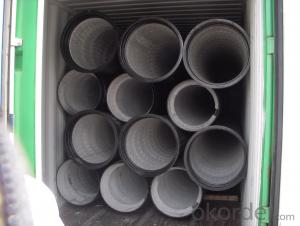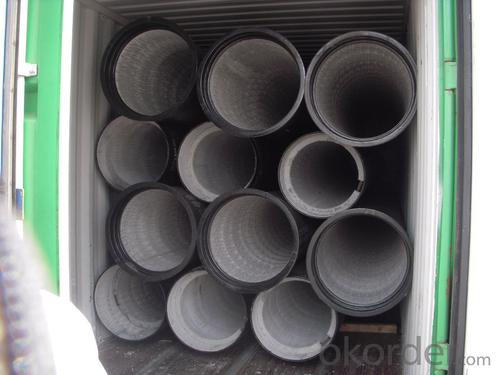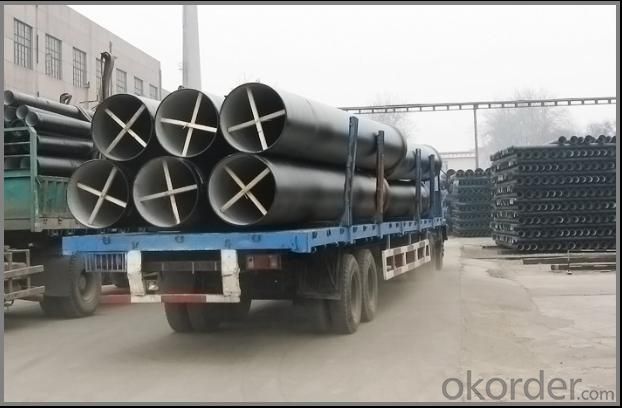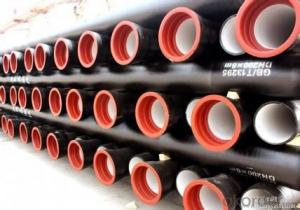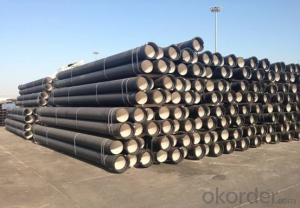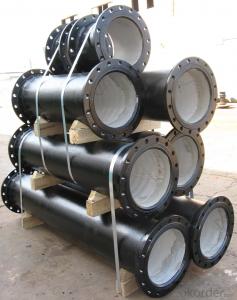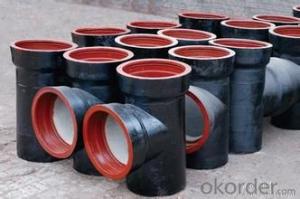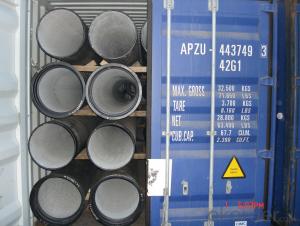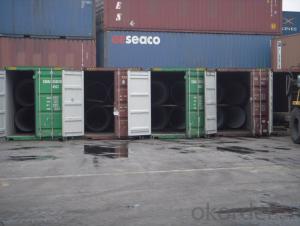DUCTILE IRON PIPES C Class DN150
- Loading Port:
- China Main Port
- Payment Terms:
- TT OR LC
- Min Order Qty:
- -
- Supply Capability:
- -
OKorder Service Pledge
OKorder Financial Service
You Might Also Like
Ductile Iron Cast Pipe is without any defects compare with tradition casting tech, which has many advantages particularly as follow:
(1) High density. In the "vertical upward casting" process, the melt iron of centre liquid column in center crystallizer is continuously feeding for volume shrinkage caused by condensation tube at outer circumference , which lead to be free of shrinkage porosity.
(2) High purity. When melt iron pouring, the mixed impurities such as gas, dross, sand grain which are lighter than melt iron could be eliminated at furnace mouth, its impossible to enter into the crystallizer through the channel, so the melt iron into the crystallizer is very pure.
(3) Strength with toughness. The cooling speed provided by continuous crystallizer is 30 times than sand casting and 5 times than centrifugal casting, and doesn't produce white iron, the eutectic cell volume of continuous cast iron is one eighth to one tenth compare with traditional cast iron. The density of graphite nodule in ductile iron can reach 300-700 pcs/mm2. Therefore, all reason above improve the strength and toughness of continuous cast iron.
(4) Free machining. The high speed cooling make the hardening phase (such as boride, steadite) not appear like reticular, massive or thick, but diffuse like fish bone and pane in shape, moreover, there are tiny graphite flakes inlaid hardening phase. It's free machining in BrinellHardness the range of 250-300HB. However, the Brinell Hardness of 250 is top limit to common metal materials.
(5) Uniform composition of tube wall. The convection mixing of liquid column caused by marching type drawing in crystallizer make the composition of tube wall well-distributed, and concentration gradient very little.
(6) High productivity. To the wall thickness of tube under 10mm, the speed of continuous casting is 1 meter/min, to the wall thickness of tube under 20mm, the speed of continuous casting is 0.5 meter/min, which is high efficiency that centrifugal or other casting tech couldn't reach.
- Q: Are ductile iron pipes suitable for industrial water systems?
- Yes, ductile iron pipes are suitable for industrial water systems. They possess excellent strength, durability, and corrosion resistance, making them ideal for transporting water in industrial settings. Additionally, their ductility allows them to withstand high pressure and accommodate for ground movement, ensuring long-term reliability in industrial water systems.
- Q: What is the expected thermal expansion coefficient of ductile iron pipes?
- The expected thermal expansion coefficient of ductile iron pipes varies depending on several factors, including the specific composition of the iron and the temperature range in which the pipes are being used. However, as a general guideline, the thermal expansion coefficient of ductile iron pipes typically falls within the range of 10 to 14 x 10^-6 per degree Celsius (10-14 μm/m°C). This means that for every degree Celsius increase in temperature, a ductile iron pipe will expand by approximately 10 to 14 micrometers per meter of length. It is important to note that these values are approximate and may vary depending on the specific conditions and application of the pipes.
- Q: The benefits of ductile iron castings
- Nodular cast iron has developed rapidly to be second only to grey cast iron and widely used as cast iron material. The so-called "iron instead of steel", mainly refers to ductile iron
- Q: What effect does magnesium play in nodular cast iron?
- Magnesium can be graphite precipitated in spherical form.But the specific mechanism is not clear, and now it is still debated in the academic circles.In addition, magnesium and sulfur generate MgS, which removes S from molten iron, which impedes the formation of spheroidal graphite.Therefore, Mg has two functions to eliminate the influence of S on Nodular Iron and promote the precipitation of graphite in spherical form.
- Q: How do ductile iron pipes handle ground settlement near construction foundations?
- Ductile iron pipes are known for their strength and durability, making them highly resistant to ground settlement near construction foundations. Due to their flexible nature, these pipes can withstand minor ground movements without experiencing significant damage or failure. The inherent flexibility of ductile iron pipes allows them to adapt and adjust to ground settlement, ensuring the integrity of the pipeline system even in challenging conditions.
- Q: Are ductile iron pipes suitable for trenchless pipe bursting methods?
- Yes, ductile iron pipes are suitable for trenchless pipe bursting methods. They have the necessary strength and flexibility to be effectively burst and replaced without the need for extensive excavation.
- Q: What is the expected sound transmission loss of ductile iron pipes?
- The sound transmission loss of ductile iron pipes can vary depending on factors like pipe thickness, diameter, and the surrounding environment. Generally, ductile iron pipes have good soundproofing properties because they are dense and heavy. They are designed to minimize noise transmission and vibration. Ductile iron pipes can significantly reduce noise transmission. The material's density and mass block sound waves and reduce their transmission. However, it is important to note that the sound transmission loss of ductile iron pipes may not be as high as other specialized soundproofing materials like acoustic insulation or double-wall piping systems. To accurately determine the expected sound transmission loss of ductile iron pipes in a specific application, it is recommended to consult the manufacturer's specifications or conduct acoustic tests following relevant standards like ASTM E90. These tests can provide precise data on the sound transmission loss values of ductile iron pipes under different conditions, ensuring proper noise control and acoustic performance in specific installations.
- Q: What are the differences between cast iron pipes W and A?
- Type W: combination of both advantages of the connection type A interface has the advantages of high strength and convenient installation, because of the use of W type straight pipe and reduces the material cost and can be coupled with the design structure of the B type pipe is more compact than the A type pipe, saving installation space.
- Q: What are the different types of linings available for ductile iron pipe?
- There are several different types of linings available for ductile iron pipe, each with its own advantages and applications. 1. Cement mortar lining: This is one of the most common linings used for ductile iron pipes. It consists of a layer of cement mortar applied to the interior surface of the pipe. Cement mortar lining provides excellent resistance to corrosion and chemical attack, making it suitable for a wide range of applications, including potable water distribution, wastewater conveyance, and industrial pipelines. It also helps to reduce friction and turbulence within the pipe, improving flow efficiency. 2. Polyethylene lining: Polyethylene linings are often used in ductile iron pipes for applications where corrosion resistance is a primary concern. This lining consists of a layer of high-density polyethylene (HDPE) that is either extruded or sprayed onto the pipe's inner surface. Polyethylene lining provides superior resistance to corrosion, abrasion, and chemical attack, making it ideal for transporting aggressive fluids, such as saltwater, chemicals, or industrial waste. 3. Polyurethane lining: Polyurethane linings are commonly used in ductile iron pipes for applications where enhanced protection against abrasive wear is required. This lining is formed by spraying or pouring a layer of polyurethane onto the inner surface of the pipe. Polyurethane lining offers excellent resistance to abrasion, impact, and chemical attack, making it suitable for conveying abrasive slurries, mining applications, and other high-wear environments. 4. Epoxy lining: Epoxy linings are applied to ductile iron pipes to provide a protective barrier against corrosion and chemical attack. This lining is typically formed by applying a layer of epoxy resin to the pipe's inner surface through a process known as centrifugal casting or electrostatic spraying. Epoxy lining offers excellent adhesion and resistance to corrosion, making it suitable for various applications, including potable water distribution, wastewater treatment, and industrial pipelines. 5. Zinc lining: Zinc linings are used in ductile iron pipes to provide cathodic protection against corrosion. This lining involves applying a layer of zinc to the pipe's inner surface, either through hot-dip galvanizing or by electroplating. Zinc lining acts as a sacrificial anode, corroding preferentially to the iron pipe and protecting it from corrosion. It is commonly used in applications where the pipe is exposed to highly corrosive environments, such as seawater or acidic soils. Overall, the choice of lining for ductile iron pipes depends on the specific requirements of the application, including the type of fluid being transported, the level of corrosion resistance needed, and the potential for abrasive wear. Consulting with industry experts and considering factors such as cost, longevity, and maintenance requirements can help determine the most suitable lining option for a particular project.
- Q: What is the DN400 installation charge for ductile iron pipes?
- The wages paid under special circumstances: refers to the provisions of the state laws, regulations and policies, due to illness, injury, maternity leave, family planning leave, funeral leave, leave, leave, leave, regular shutdown, implementation of national or social obligations due to pay a certain percentage of wage hourly wage or salary when.
Send your message to us
DUCTILE IRON PIPES C Class DN150
- Loading Port:
- China Main Port
- Payment Terms:
- TT OR LC
- Min Order Qty:
- -
- Supply Capability:
- -
OKorder Service Pledge
OKorder Financial Service
Similar products
Hot products
Hot Searches
